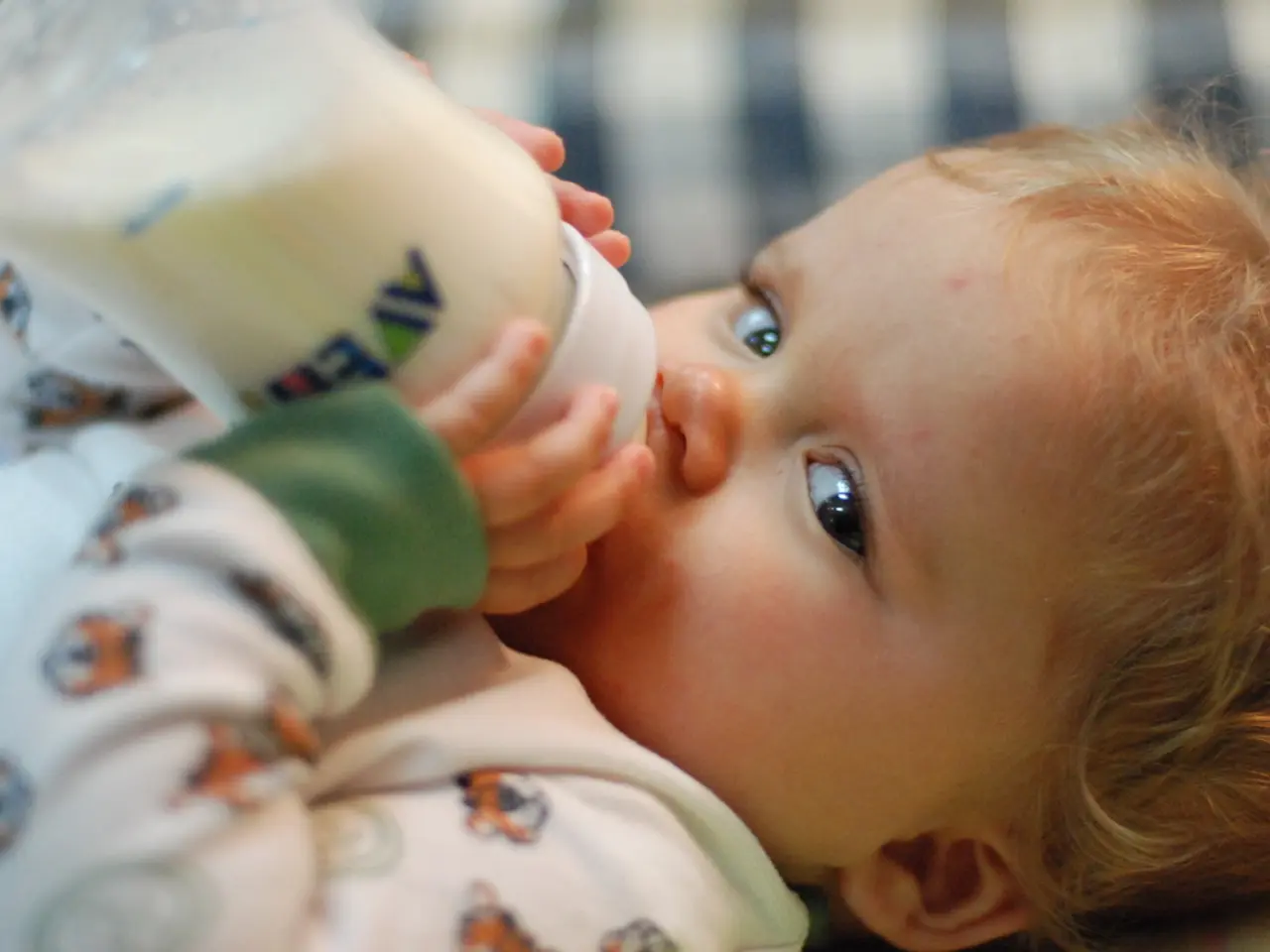Water and More: Hydration Options for Infants
Babies' hydration needs vary depending on their age, weather, activity level, and dietary intake. According to the American Academy of Pediatrics (AAP), exclusive breastfeeding or formula milk is sufficient for newborns up to 6 months, with no need for water. Starting around 6 months, small amounts of water can be introduced alongside solid foods, gradually increasing as the baby grows older.
For babies aged 6-12 months, the recommended water intake is approximately 4-8 ounces per day. This increases to 8-32 ounces daily for babies aged 12-24 months, with water offered at meals, snacks, and throughout the day.
Several factors influence a baby's water requirements. Age is a significant factor, as hydration methods and amounts vary as the infant grows. Weather and activity level also play a role, with hot weather and more active babies requiring more fluids. Dietary intake is another factor, as high water-containing foods like fruits, vegetables, and soups contribute to overall hydration.
Parents should watch for signs of dehydration in babies, such as fewer than 6 wet diapers per day, dry mouth or lips, sunken eyes or cheeks, unusual fussiness or lethargy, and poor skin turgor. If dehydration signs appear, parents are advised to consult a pediatrician.
Understanding the basics of hydration for babies is essential for parents to provide adequate water intake for their little ones and prevent dehydration. Introducing complementary foods is an important step in meeting a baby's nutritional requirements while ensuring hydration.
In hot weather, limiting sun exposure, dressing babies appropriately in lightweight, breathable clothing, and offering fluids specifically formulated to rehydrate are crucial to prevent dehydration and overheating. Breast milk or formula milk should still remain the primary source of hydration for babies, even as they begin to consume complementary foods.
Common physical symptoms of dehydration in babies include dry lips and mouth, sunken eyes, decreased urine output, and dry skin. In severe cases, dehydration can lead to a fontanelle (soft spot on the baby's head) that appears sunken, rapid breathing, and a rapid or weak pulse. These signs require immediate medical attention.
Complementary foods should begin around six months of age, following the guidance of healthcare professionals. Breast milk is often considered the ideal source of hydration for babies, as it not only provides essential nutrients but also ensures optimal hydration. Exclusive breastfeeding promotes bonding between the mother and baby and contributes to improved emotional and cognitive development in babies.
During illness, recognizing signs of dehydration, offering fluids specifically formulated to rehydrate, and avoiding sugary beverages, carbonated drinks, or caffeinated beverages is important to prevent dehydration and ensure a speedy recovery. Starting with small amounts and gradually increasing the variety and consistency of foods helps the baby adjust to new tastes and textures.
Water is vital for infants as it helps in regulating their body temperature, promoting healthy digestion, supporting brain development, and maintaining overall hydration balance. Several factors influence a baby's water requirements, such as the climate they live in, level of activity, overall health, and frequency of breastfeeding or formula feeding. In hot and humid weather, babies need more water to prevent dehydration. If a baby is unwell and experiencing diarrhea or vomiting, their water intake should be increased to compensate for the fluid loss.
In some cases, medical intervention, such as intravenous fluids, may be required to restore hydration levels. The importance of adequate hydration for babies is discussed in this blog post. It is crucial to act promptly when a baby shows signs of dehydration to prevent complications and ensure the baby's well-being.
- For optimal health, it's essential for parents to provide sufficient water to their babies, given their age, weather, activity level, and dietary intake.
- Breastfeeding provides not only essential nutrients but also ensures optimal hydration for babies, making it an important step in meeting their hydration needs.
- As babies grow older, their water intake increases, with safety measures like limiting sun exposure and offering water at regular intervals becoming important during hot weather.
- Toddlers require healthy food choices and appropriate water consumption to support their development, including brain development and healthy digestion.
- Water plays a significant role in children's overall well-being, as it helps maintain their hydration balance, promotes cognitive development, and regulates their body temperature.
- During times of illness, focusing on rehydration through appropriate fluids and maintaining proper nutrition is crucial for a speedy recovery and prevention of dehydration.
- Children's behavior and health can be influenced by adequate hydration, making it essential for parents to monitor their children's water intake and adjust it accordingly based on the various influences on their needs.




